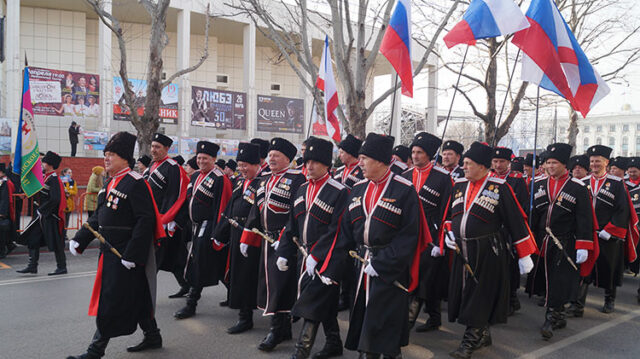
Cossacks Used to Promote Moscow’s War Against Ukraine
Publication: Eurasia Daily Monitor Volume: 20 Issue: 27
By:

Morale is a critical resource during wartime, and the role of Russia’s state-organized Cossack movement in shoring up the home front has been significant (see EDM, May 10, 2022). In truth, making President Vladimir Putin’s case for his war to the Russian people may ultimately prove more consequential than the combat functions of the Cossack units, and the Putin regime seems well-aware of this possibility. The inaugural Ataman’s reception dedicated to the Day of Russian Press was held in the headquarters of the All-Russian Cossack Society (VsKO) in Moscow on January 17. Indeed, at the ceremony, Nikolai Doluda “stressed that in the context of exacerbated geopolitical realities, the role of the media in consolidating civil society and contributing to strengthening the national security of the country is increasing.” Turning specifically to the VsKO, of which he is the head, Doluda praised the assembled journalists declaring, “Thanks to your great professionalism and stately information policy of the leading Russian publications, the Cossacks have entered the media agenda more prominently. In 2022, about 100,000 news items were published on the Cossack theme. This is three times more than in 2021. Obviously, this is the result of teamwork from the press service of the VsKO, constant interactions with the mass media and the Presidential Council’s interactions with Cossacks.” The Cossack leader then awarded medals to the most active journalists, answered questions and discussed making the reception an annual event (Vsko.ru, January 17). Thus, supporting the Kremlin’s official narratives for the war and selling the Putin regime’s justifications seems to be a key role undertaken by those Cossacks loyal to Moscow.
Accentuating this point is the completion of work on a special documentary series about the Cossack “heroic defenders” (read “aggressors”) of Donbas made by the mother of one of the Cossacks fighting in Ukraine, Olesya Shigina. The idea to create a documentary series called “Cossack Regiments” about these volunteers over the past eight years of fighting was finalized in the meeting between mothers of the mobilized and Putin on November 25 and was approved by the Russian president directly (see EDM, December 7, 2022). For the series, Shigina traveled the entire front line from Luhansk to Donetsk, following her son and “completely ignoring how dangerous it was.” Naturally, the series featured ostensibly heroic acts from the Russian Cossacks, leaving one to wonder: “Are [the Cossacks] like this because it is in their blood or does the war make them brave, revealing their best human qualities?” (Vsko.ru, January 30). Whether such propaganda initiatives are to be believed, perhaps most impactful is that they repeat Moscow’s narratives and allow such ideas to spread and influence discourse.
Of course, the main element in this propaganda machine is the VsKO’s website itself, as well as those of the regional hosts, which preceded the main site temporarily. For the VsKO, a recent article highlighting the first group of Cossack drone operators being trained in the city of Maykop (Krasnodar region) is an illuminating example. The training took place at a “center of combat coordination of the Cossack volunteer detachment ‘Kuban,’ [which] was created in 2022.” The center “makes it possible to train Cossacks systematically in those military specialties in which they will perform their tasks in the combat zone. In addition to acquiring skills in the management, assembly and manufacture of UAVs [unmanned aerial vehicles], Cossack volunteers are trained in the areas of engineering, tactics, flight, topography, geospatial orientation, radio training and artillery adjustment.” The center has branch campuses in Samara and Adygea as well (Vsko.ru, January 13).
In addition to highlighting the modernity of Russian forces, such articles also demonstrate how modern war requires the whole of society to be aligned behind the same goals. In this, the issue of morale is particularly crucial given reports in Western media suggesting growing unease among Russians at the staggering losses in Ukraine and even the possibility of a coup against Putin (Eurasiareview.com, January 28). It seems that Moscow believes that displays of brave soldiers fighting for a “noble” cause is an effective approach for restoring this flagging morale.
So too, at the regional level, the Cossacks are valorized as heroic individuals who have fought honorably. In Orenburg, for instance, Cossacks returning on rotation from duties in Ukraine were met by other Cossack “brothers” led by the Ataman of the regional Cossack society there near the monument to Russian hero Alexander Prokhorenko (Ataman-ovko.ru, January 1). In Crimea, the Black Sea Cossacks are holding an essay competition for children dedicated to the Defender of the Fatherland Day, titled “Heroes of Our Time” (Vko-chkv.ru, January 31). In January 2023, in a tiny Cossack district of the Don region, locals collected “humanitarian aid” to send to people in Donbas. According to reports, all locals of Aksay region participated in the effort to find humanitarian aid, efforts which were directed by local man Oleg Denis (Don-kazak.ru, January 31). Finally, in the Stavropol region, obituaries have been dedicated to eulogizing those Cossacks who died fighting in eastern Ukraine (Terkv.ru, February 1). Such events and their propaganda potential come at a critical time for Russia’s military efforts in Donbas—efforts which the state-controlled Cossacks appear only to eager to fill.



